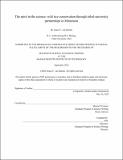The spirit in the science: wild rice conservation through tribal-university partnerships in Minnesota
Author(s)
van Deelen, Grace C.
DownloadThesis PDF (279.5Kb)
Advisor
O'Connor, Maura
Terms of use
Metadata
Show full item recordAbstract
In 2018, an unlikely partnership formed at the University of Minnesota, called the “Kawe Gidaa-naanaagadawendaamin Manoomin” (“First we must consider Manoomin / Psiη”) collaboration. The research collaboration, whose express purpose is to protect wild rice, includes both tribal and non-tribal institutions and members. Since 2018, the group has grown to include social scientists, graduate students, and undergraduate researchers. The research partners are now probing scientific and ethical questions about wild rice decline in the upper Midwest and the role of genetic research at the university.
The “First” collaboration is one of a handful of tribal/university research partnerships that have sprung up around the country to include tribal perspectives and traditional knowledge in mainstream ecological research. More than stakeholders, tribal partners involved in these projects share power and governance over research alongside mainstream institutional partners. However, such partnerships are not isolated from the complicated histories of European settler colonialism that persist through US institutions today. Finding a way to reconcile those histories is crucial to the success of the partnerships themselves. In the case of the “First” collaboration, reconciling these histories means deeply investing in relationships — relationships to the land and between people — even if that means putting data collection on hold.
Date issued
2022-09Department
Massachusetts Institute of Technology. Program in Comparative Media Studies/Writing; Massachusetts Institute of Technology. Graduate Program in Science WritingPublisher
Massachusetts Institute of Technology